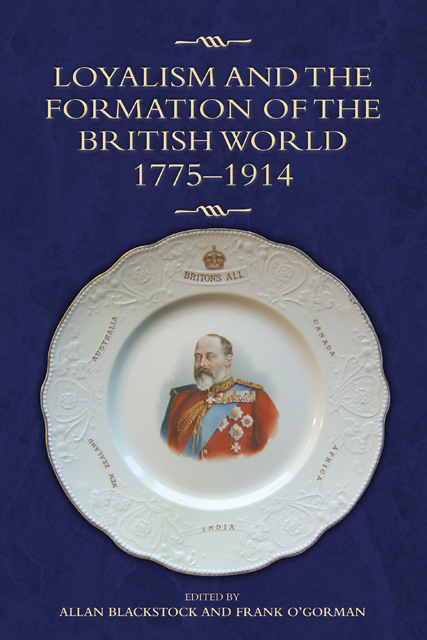Book contents
- Frontmatter
- Contents
- Notes on Contributors
- 1 Loyalism and the British World: Overviews, Themes and Linkages
- 2 Origins and Trajectories of Loyalism in England, 1580–1840
- 3 The ‘Spirit of Loyalty’: Material Culture, Space and the Construction of an English Loyalist Memory, 1790–1840
- 4 Anti-Catholicism and Orange Loyalism in Nineteenth-Century Britain
- 5 Loyalty and the Monarchy in Ireland, c.1660–c.1840
- 6 The Trajectories of Loyalty and Loyalism in Ireland, 1793–1849
- 7 Presbyterians, Loyalty and Orangeism in Nineteenth-Century Ulster
- 8 Unionists and Patriots: James Whiteside, the Irish Bar and the Dilemmas of the Protestant Nation in Victorian Ireland
- 9 Loyalism in British North America in the Age of Revolution, c.1775–1812
- 10 ‘A Colonial Hybrid’: Nineteenth-Century Loyalism as Articulated by the Orange Order in the Maritime Colonies of British North America
- 11 Canadian Catholics, Loyalty, and the British Empire, 1763–1901
- 12 Loyalism in Australasia, 1788–1868
- 13 ‘We love one country, one queen, one flag’: Loyalism in Early Colonial New Zealand, 1840–80
- 14 Clientelism, Community and Collaboration: Loyalism in Nineteenth-Century Colonial India
- Select bibliography
- Index
13 - ‘We love one country, one queen, one flag’: Loyalism in Early Colonial New Zealand, 1840–80
Published online by Cambridge University Press: 28 February 2023
- Frontmatter
- Contents
- Notes on Contributors
- 1 Loyalism and the British World: Overviews, Themes and Linkages
- 2 Origins and Trajectories of Loyalism in England, 1580–1840
- 3 The ‘Spirit of Loyalty’: Material Culture, Space and the Construction of an English Loyalist Memory, 1790–1840
- 4 Anti-Catholicism and Orange Loyalism in Nineteenth-Century Britain
- 5 Loyalty and the Monarchy in Ireland, c.1660–c.1840
- 6 The Trajectories of Loyalty and Loyalism in Ireland, 1793–1849
- 7 Presbyterians, Loyalty and Orangeism in Nineteenth-Century Ulster
- 8 Unionists and Patriots: James Whiteside, the Irish Bar and the Dilemmas of the Protestant Nation in Victorian Ireland
- 9 Loyalism in British North America in the Age of Revolution, c.1775–1812
- 10 ‘A Colonial Hybrid’: Nineteenth-Century Loyalism as Articulated by the Orange Order in the Maritime Colonies of British North America
- 11 Canadian Catholics, Loyalty, and the British Empire, 1763–1901
- 12 Loyalism in Australasia, 1788–1868
- 13 ‘We love one country, one queen, one flag’: Loyalism in Early Colonial New Zealand, 1840–80
- 14 Clientelism, Community and Collaboration: Loyalism in Nineteenth-Century Colonial India
- Select bibliography
- Index
Summary
Responding to an address of welcome at Nelson, February 1856, Colonel Thomas Gore-Browne, fourth Governor of the colony of New Zealand, on behalf of Queen Victoria accepted the assembled citizens’ assurances of loyalty. It was gratifying for him ‘to be able to report for Her Majesty’s information that she has not in the whole of her empire subjects more devoted to her throne and person, or more attached to the institutions of Great Britain than those settled in New Zealand’. His praise was readily accepted by those present. But how was this feeling publicly manifested? This chapter examines the extent and principal expressions of loyalism in early colonial New Zealand. Recent writers have suggested that by the mid-nineteenth century British loyalism could assume a number of forms, although the central tenets remained patriotism and the manifestation of national identity. Kumar advances as the key elements of ‘Britishness’: dynastic loyalism to the monarch, Protestantism, cultural particularism, and a firm commitment to imperialism. O’Gorman also notes a readiness of citizens to take up arms in response to perceived threats. He also points to the broad-based nature of loyalism, and how, through associationism, it could be a means of achieving respectability and status. New Zealand’s loyalism, however, while drawing its inspiration from British loyalism, was not simply a replication. It evolved in a different physical environment, with a reworked ethnic mix, a modified social order, and a new major threat. New Zealand was ultimately not Britain. In consequence, loyalism in the colony tended to be more flexible, more pragmatic.
‘The Britain of the South’
Most distant of Britain’s colonies, New Zealand was the last of the future dominions to be founded. Following the 1840 negotiation of the Treaty of Waitangi with the Maori tribes, and a brief period as a dependency of New South Wales, the islands were created a separate Crown Colony in mid-1841. Within fifteen further years representative, then responsible government, had been granted. While the initial colonising impetus was provided by a London joint-stock enterprise, the New Zealand Company, after 1853 this became the responsibility of the colonial assembly and a quasi-federal clutch of provincial administrators (Map).
Information
- Type
- Chapter
- Information
- Loyalism and the Formation of the British World, 1775-1914 , pp. 241 - 262Publisher: Boydell & BrewerPrint publication year: 2014
